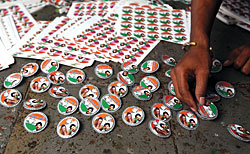 AL JAZEERA ENGLISH |
The newspaper columns and television channels seethe with insults, accusations and bitterness. The Election Commission, perhaps the most respected institution in the country, tries in vain to urge civility upon the politicos but ends up scolding dozens for their nasty words and bad behavior. Old warhorses like Jaswant Singh of the BJP get caught handing out money while a Sikh journalist's shoe brings down the mighty and blood-tainted Congress power broker Jagdish Tytler in Delhi.
A firestorm of argument and capricious commentary passes for debate over issues. One scion of the Nehru Gandhi dynasty keeps everyone guessing on his intentions for matrimony and the prime minister's office. Another, the execrable Varun Gandhi, utters perhaps the vilest words of all, aimed at Muslims and Sikhs, exposing his Hindutva-obsessed party to ever-closer scrutiny.
Number crunchers and commentators update their state-by-state tallies every hour of every day trying to augur a result. The big national parties claim confidently that they're pulling ahead and the days of fractured mandates are fading. An emboldened Communist Party of India (Marxist) says it's efforts to create a non-Congress, BJP-free 'Third Front' will bear fruit. Thus may India have its first Dalit prime minister, it's claimed by supporters of an apparently resurgent Uttar Pradesh chief minister.
The prospect makes a pampered middle class shudder in fear of the unknown. The idea that casteism has been banished from public life is given the lie every time you mention Mayawati's name in what passes for polite company.
More than statues of Babu Saheb Ambedkar in every comfortable colony in Delhi, it's the hammer and sickle of India's jungle fighting Maoists that really sets the cat among the pigeons. For proof, just take a look at the surging sighs of relief that greeted the news that the battling sons and daughters of Naxalbari only managed to kill a couple of dozen people on the first day of voting earlier this month.
For the Maoists of Chhatisgarh and surrounding states are India's greatest fear at the moment: however much the media, officialdom and other political parties play them down. As we know in Nepal, the followers of China's Great Helmsman are willing to take their time as power flows their way from the barrel of a gun. They don't call it a long march for nothing. What's truly remarkable is how little the insurgency figures in this campaign. It's a dark, no-go area of fear and loathing where candidates dare not take on the men and women of violence. Nor do we hear much creative musing from those who would govern about their plans for the guerrilla-ridden enclave that arcs from south of the Vindhyas to north Bihar.
At most, the challenge of the Maoist uprising is seen as a security problem, needing more tribal militias, more security forces, more fighting fire with fire. There's little or no talk of development, ending discrimination, bringing jobs and reclaiming lost territory with positive policies. Or rather, that's what they say they'll do. But little is offered in the way of specifics. It's not the only issue in this election, just the one that candidates, commentators and the public seem least comfortable contemplating.
And yet it's hard not to be fascinated and thrilled by the panoramic exercise of balloting in this vast, unwieldy land. Only an utter cynic would fail to see the hopes for renewal that many of the downtrodden bring to the ballot box. India does the mechanics of elections rather well, as good as any country. To students and devotees of democracy, it's a transcendent moment.
There's no doubting India's wonderful ability to stage elections. If only there were a way to apply that extraordinary tenacity and commitment to ending the poverty that fuels Maoism...wonder what the Election Commission is doing after May 16th?



